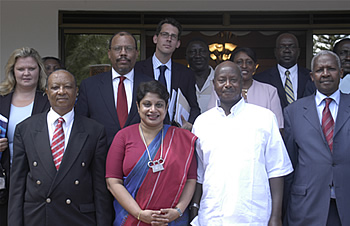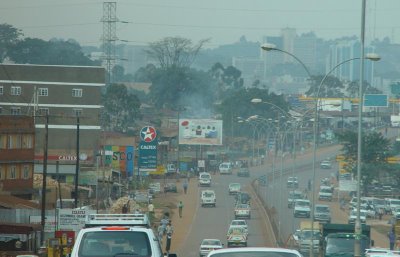 Uganda is facing an energy crisis that has resulted into massive economic depression. Tanzania like Uganda is facing reduced power supply as result of drought. Kenya which has depended more on thermal power for sometime now and previously imported power from Uganda's Owen Falls Dam, is soon to be an exporter of power to Uganda in the short term.Among the three East African,states Kenya is the only state which seems to have survived this energy Tsunami.Overall-Sub-Saharan Africa is facing an energy deficit which threatens its relatively improving investment climate. Overall, good governance that has been a key issue of contention for improved investment opportunities is being addressed in many countries. The prospects of over conflicts are waning except in the horn of Africa. The government of Uganda is currently talking peace in Juba with the Lord Resistance Army with the mediation of Dr.Riek Machar the Vice President of South Sudan (GoSS). Elections in the Democratic Republic of Congo point to a more civilized engagement by political opponents in the post election period.In Burundi, former beligerents are now looking at another approach of constructive engagement to rebuild the country from years of war.
Uganda is facing an energy crisis that has resulted into massive economic depression. Tanzania like Uganda is facing reduced power supply as result of drought. Kenya which has depended more on thermal power for sometime now and previously imported power from Uganda's Owen Falls Dam, is soon to be an exporter of power to Uganda in the short term.Among the three East African,states Kenya is the only state which seems to have survived this energy Tsunami.Overall-Sub-Saharan Africa is facing an energy deficit which threatens its relatively improving investment climate. Overall, good governance that has been a key issue of contention for improved investment opportunities is being addressed in many countries. The prospects of over conflicts are waning except in the horn of Africa. The government of Uganda is currently talking peace in Juba with the Lord Resistance Army with the mediation of Dr.Riek Machar the Vice President of South Sudan (GoSS). Elections in the Democratic Republic of Congo point to a more civilized engagement by political opponents in the post election period.In Burundi, former beligerents are now looking at another approach of constructive engagement to rebuild the country from years of war.Development Partners?
This means governments are now at a time when they are supposed to execute their mandates in Public Policy. Good governance means institutional accountability and efforts have been made in this direction. For long we have wasted alot of resources fighting proxy wars on behalf of our colonial God fathers. Alot of resources have been invested in building war-machines rather infrastructures that help build a broad foundation for the private-sector to effectively absorb the hugely redandunt human resource. Kenya's economy has withered from external pressure due to state protectionism through resistance from ferocious assaults from the two sister Bretton Wood Institutions. Strategic Public Interventions have been part of the state agenda in Kenya which helped stave off unwarranted interference in the Kenyan Economy.That despite years of aid cuts due to political disagreements with donors, the Kenyans economy continued to grow through mobilization of local resources.
 Uganda's case has been different. Totally donor dependent it would be hard to imagine how the country could run without donor support. Public interventions have not been part of the blue print. It is the IMF/World Bank that has run the show unleashing market forces in an economy that needs serious rehabilation. The knee-jack response to the energy crisis through termal generation points to a government that has been in slumber for so long. Since the commissioning of the Owne Falls Dam in 1954 by the Colonial Government there has not been any structural response to the growing energy demand. The Nalubale Extension was built premised on wrong Engineering design albeit certified by government engineers. Intelligence has it that the Egyptians with their strong diplomatic foot work in Washington have consitently sabotaged any effort to construct any Dam along the Nile. That private investors can't stand in the way of a state looking at the Nile as its stategic security interest should not be magic to the Uganda government. To many observers, it is very puzzling that the Ugandan government is aloof at the potential of sabotage by the Egyptian Intelligence with a resident hydrologist at the rank of an Ambassador in Jinja.
Uganda's case has been different. Totally donor dependent it would be hard to imagine how the country could run without donor support. Public interventions have not been part of the blue print. It is the IMF/World Bank that has run the show unleashing market forces in an economy that needs serious rehabilation. The knee-jack response to the energy crisis through termal generation points to a government that has been in slumber for so long. Since the commissioning of the Owne Falls Dam in 1954 by the Colonial Government there has not been any structural response to the growing energy demand. The Nalubale Extension was built premised on wrong Engineering design albeit certified by government engineers. Intelligence has it that the Egyptians with their strong diplomatic foot work in Washington have consitently sabotaged any effort to construct any Dam along the Nile. That private investors can't stand in the way of a state looking at the Nile as its stategic security interest should not be magic to the Uganda government. To many observers, it is very puzzling that the Ugandan government is aloof at the potential of sabotage by the Egyptian Intelligence with a resident hydrologist at the rank of an Ambassador in Jinja.Hon.Amon Muzoora Chairman Natural Resource Committee in the 7th Parliament moved a bill against the 1929 Agreement that ceded alot of power to Egypt over the Nile. The Egyptian Embassy in Kampala organized a working trip for Amon Muzoora to Cairo only to come back home a week later mute about his fact finding mission. Like Parliamentarians who go to Belarus in winter to investigate junk military choppers, public policy mamagement in the information age require institutional frame-works that are functional. The inter agency duplication that is visible is purely political rather than strategically aimed at efficiently delivering services to the masses.
Symbol of Predation or Legislation?
Symbol of Predation or Legislation?
 Uganda, like many states in Africa are still stuck in the industrial revolution state structures in the Information age. They are huge and suck resources away from from development programs to pay wages of political hang-ons. It will require alot of effort to dismantle the dinasour of government that Uganda has today. It is a huge government that cannot address glaring public concerns due to burden the public administration impacts on the state. Amidst political predation, there descent even in the civil service that the public service that forms the political class is predating on the treasury. Now dons are on strike, doctors are threatening to go on strike anytime, Makerere University has been shut down, parliament is demanding shs.20bn for purchase of comfortable cars for honourables, teachers are poorly renumerated just like the police force. Meanwhile, all roads in the capital city are in a state of decay with man-holes bringing down fuel tankers cutting off traffic.
Uganda, like many states in Africa are still stuck in the industrial revolution state structures in the Information age. They are huge and suck resources away from from development programs to pay wages of political hang-ons. It will require alot of effort to dismantle the dinasour of government that Uganda has today. It is a huge government that cannot address glaring public concerns due to burden the public administration impacts on the state. Amidst political predation, there descent even in the civil service that the public service that forms the political class is predating on the treasury. Now dons are on strike, doctors are threatening to go on strike anytime, Makerere University has been shut down, parliament is demanding shs.20bn for purchase of comfortable cars for honourables, teachers are poorly renumerated just like the police force. Meanwhile, all roads in the capital city are in a state of decay with man-holes bringing down fuel tankers cutting off traffic. It all points to that amorphous government that is so heavy to respond contructively and timely. Government structures like that are for regime preservation through building political bases centered on ethnicity, religion rather than service delivery and infrastructural development.
It all points to that amorphous government that is so heavy to respond contructively and timely. Government structures like that are for regime preservation through building political bases centered on ethnicity, religion rather than service delivery and infrastructural development.  It is this tactical mistake that any regime would want to restructure. It by summoning political will that the government and the state would work to Re-engineer business process with respect to the citizens they serve and the business community. It's by these structural observations that government policy advisors would help the political leadership look at the desired reforms. At the moment indeed there are many national challenges and all Ugandans seem to appreciate those strategic challenges. When government behaves in a manner that is so extravagant as to plan for the comfort of MPs with a whopping budgent of shs.20bn, no one will stand by it. Uganda as a family needs to have cohesion in the direction it must take. Demonstrations are an expression of political disagreements by people who do not have another voice. Ugandans are saying to government that you have to be frugal in the way you manage our public policy concerns. They are calling on government to understand that it is there because of them and not the reverse.
It is this tactical mistake that any regime would want to restructure. It by summoning political will that the government and the state would work to Re-engineer business process with respect to the citizens they serve and the business community. It's by these structural observations that government policy advisors would help the political leadership look at the desired reforms. At the moment indeed there are many national challenges and all Ugandans seem to appreciate those strategic challenges. When government behaves in a manner that is so extravagant as to plan for the comfort of MPs with a whopping budgent of shs.20bn, no one will stand by it. Uganda as a family needs to have cohesion in the direction it must take. Demonstrations are an expression of political disagreements by people who do not have another voice. Ugandans are saying to government that you have to be frugal in the way you manage our public policy concerns. They are calling on government to understand that it is there because of them and not the reverse.The fundamental solution therefore is to streamline government through structural reforms so that a small but efficient people-centered government is established for the sole purpose of serving the people. This is called an Information Age government and state.
Shaka Robert.

